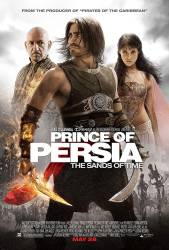Corrected entry: The story unfolds at a time when the Persian Empire is still strong. At that time, Persia was not yet subjugated by the Arabs who later on adulterated their Persian language with the Arabic script and the Islam religion. Why then, can the Arabic language be heard spoken by the background actors? Why then, is the decree signed by the newly enthroned King (the eldest son)in the Arabic script, which was not yet invented at that time?
Corrected entry: In the Prince of Persia the King speaks about bring a boy (Dastan) into his family, all of this is said in front of Princess Tamina. Then, while Dastan and Tamina are walking, Tamina goes on to say he really walks like a prince of Persia and that he was told the world was his since birth and that he'd believed it. Dastan corrects her explaining he was not born a Prince. I thought this was already covered when the king said it.
Correction: You're right, but you have to consider Tamina's city had just been overtaken and she herself was captured to be presented to the king. I don't think listening in to whatever they were saying mattered to her at the time. She was most likely thinking up a plan to escape. Plus the king merely mentions it and does not elaborate. I think it's safe to say she didn't know what he meant and certainly it wasn't easy to assume what had really happened. That doesn't seem like a plot hole.
Corrected entry: When Tus proposes marriage to Tamina and she agrees, Tus grabs her left hand to kiss with his right hand (you can tell it is her left arm based on the fingers). The very next shot shows him raising her right arm up in solidarity. The shot is immediate and there is not enough time for her to have switched arms nor for her to have raise/lowered one.
Corrected entry: When Sheik Amar talks about his last ostrich Anita, he is referring to her as "she", but in the picture, it's obviously a male ostrich. Male ostrich are black with a white tail. Female ostrich, however, are greyish black.
Corrected entry: The ostrich-jockeys have Western numerals written on the square cloth stitched to their backs (1,2,3,4,5).
Correction: No, they have Arabic numerals written on their backs. Western culture adopted the Arabic numerals over Roman numerals. As the movie is in the Middle East, the numerals shown are correct.
Corrected entry: In the beginning when the King's soldiers catch the little boy, he calls the king "Sire", which is an English Title for Medieval English kings, while Persians call their Kings "Shah" and "Sultan".
Corrected entry: In the Scene where Dastan and Tamina are underground and the landslide begins, Tamina seeks refuge by climbing up the stairway, while Dastan is swept down and has to superjump over the Abyss to the door on other side. How then did Tamina manage to cross the Abyss and help Dastan defeat the Hassasin on the other side?






Correction: For the same reason that the primary cast members are all speaking modern-day colloquial English, which is not only inappropriate for the time period, but also for the geographical region. Historically set movies routinely use present-day languages and writing for simplicity. This is a standard movie convention and is not considered a mistake.
Tailkinker ★